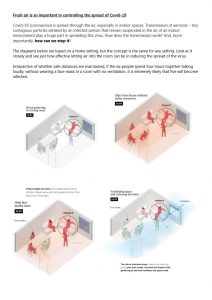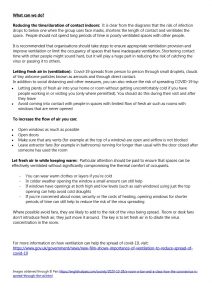Why fresh air is so important in controlling Covid-19
Ventilation is the process of introducing fresh air into indoor spaces while removing stale air. Letting fresh air into indoor spaces can help remove air that contains virus particles and prevent the spread of coronavirus (COVID-19).
When someone with COVID-19 breathes, speaks, coughs or sneezes, they release particles (droplets and aerosols) containing the virus that causes COVID-19. While larger droplets fall quickly to the ground, smaller droplets and aerosols containing the virus can remain suspended in the air. If someone breathes in virus particles that are suspended in the air, they can become infected with COVID-19. This is known as airborne transmission.
In poorly ventilated rooms the amount of virus in the air can build up, increasing the risk of spreading COVID-19, especially if there are lots of infected people in the room. The virus can also remain in the air after an infected person has left.
Bringing fresh air into a room and removing older stale air that contains virus particles reduces the chance of spreading COVID-19. The more fresh air that is brought inside, the quicker any airborne virus will be removed from the room.
Ventilation is most important if someone in your household has COVID-19 or if you are indoors with people you do not live with.
Good ventilation has also been linked to health benefits such as better sleep and fewer sick days off from work or school.

